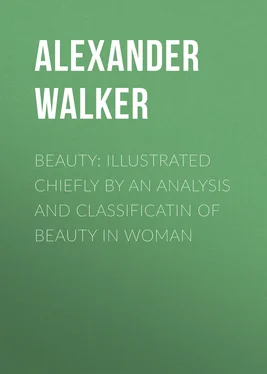Alexander Walker - Beauty - Illustrated Chiefly by an Analysis and Classificatin of Beauty in Woman
Здесь есть возможность читать онлайн «Alexander Walker - Beauty - Illustrated Chiefly by an Analysis and Classificatin of Beauty in Woman» — ознакомительный отрывок электронной книги совершенно бесплатно, а после прочтения отрывка купить полную версию. В некоторых случаях можно слушать аудио, скачать через торрент в формате fb2 и присутствует краткое содержание. Жанр: foreign_antique, foreign_home, psy_sex_and_family, на английском языке. Описание произведения, (предисловие) а так же отзывы посетителей доступны на портале библиотеки ЛибКат.
- Название:Beauty: Illustrated Chiefly by an Analysis and Classificatin of Beauty in Woman
- Автор:
- Жанр:
- Год:неизвестен
- ISBN:нет данных
- Рейтинг книги:5 / 5. Голосов: 1
-
Избранное:Добавить в избранное
- Отзывы:
-
Ваша оценка:
- 100
- 1
- 2
- 3
- 4
- 5
Beauty: Illustrated Chiefly by an Analysis and Classificatin of Beauty in Woman: краткое содержание, описание и аннотация
Предлагаем к чтению аннотацию, описание, краткое содержание или предисловие (зависит от того, что написал сам автор книги «Beauty: Illustrated Chiefly by an Analysis and Classificatin of Beauty in Woman»). Если вы не нашли необходимую информацию о книге — напишите в комментариях, мы постараемся отыскать её.
Beauty: Illustrated Chiefly by an Analysis and Classificatin of Beauty in Woman — читать онлайн ознакомительный отрывок
Ниже представлен текст книги, разбитый по страницам. Система сохранения места последней прочитанной страницы, позволяет с удобством читать онлайн бесплатно книгу «Beauty: Illustrated Chiefly by an Analysis and Classificatin of Beauty in Woman», без необходимости каждый раз заново искать на чём Вы остановились. Поставьте закладку, и сможете в любой момент перейти на страницу, на которой закончили чтение.
Интервал:
Закладка:
Let us not then deceive ourselves respecting the source of those impressions which one sex experiences from the sight of the other. It is evidently nothing else than the more or less delicate and just perception of a certain conformity of means with a want which has been created by nature, and which must be satisfied.
“It is very obvious,” says Dr. Pritchard, “that this peculiarity in the constitution of man must have considerable effects on the physical character of the race, and that it must act as a constant principle of improvement, supplying the place in our own kind of the beneficial control [in the crossing of races] which we exercise over the brute creation.” And he adds: “This is probably the final cause for which the instinctive perception of human beauty was implanted by Providence in our nature.”
We need not wonder, then, that the Greeks should have preferred beauty to all other advantages, should have placed it immediately after virtue in the order of their affections, or should have made it an object of worship.
Even the practical application of this principle to the improvement of the human race is not a matter of conjecture. We have seen both families and nations ameliorated by the means which it affords. Of this, the Turks are a striking example. Nothing, therefore, can better deserve the researches of the physiologist, or the exertions of the philanthropist, than the fact that there are laws, of which we have yet only a glimpse, according to which we may influence the amelioration of the human race in a manner the most extensive and profound, by acting according to a uniform and uninterrupted system.
Well might Cabanis exclaim: “After having occupied ourselves so curiously with the means of rendering more beautiful and better the races of animals or of plants which are useful or agreeable—after having remodelled a hundred times that of horses and dogs—after having transplanted, grafted, cultivated, in all manners, fruits and flowers—how shameful is it to have totally neglected the race of man! As if it affected us less nearly! as if it were more essential to have large and strong oxen than vigorous and healthy men, highly odorous peaches or finely striped tulips, than wise and good citizens!”
I actually know a man who is so deeply interested in the doctrine of crossing, that every hour of his life is devoted to the improvement of a race of bantam fowls and curious pigeons, and who yet married a mad woman, whom he confines in a garret, and by whom he has some insane progeny.
Let it not be imagined that the discovery of the precise laws of crossing or intermarriage, and the best direction of physical living forces, in relation both to the vital faculties and to those of the mind, upon which knowledge and skill may operate for the improvement of our race, is a matter of difficulty.
It will be shown in this work, that there exist not only an influence of beauty and defects on offspring, but peculiar laws regulating the resemblance of progeny to parents—laws which regard the mode in which the organization of parents affects that of children, or regulates the organs which each parent respectively bestows.
It will accordingly be shown, that, as, on the size, form, and proportion, of the various organs, depend their functions, the importance of such laws is indescribable—whether we regard intermarriages, and that immunity from mental or bodily disease which, when well directed, they may ensure, or the determination of the parentage of a child—or the education of children, in conformity with their faculties—or the employment of men in society.
I conclude this brief view in the words of the writer just quoted: “It is assuredly time for us to attempt to do for ourselves that which we have done so successfully for several of our companions in existence, to review and correct this work of nature—a noble enterprise, which truly merits all our cares, and which nature itself appears to have especially recommended to us by the sympathies and the powers which it has given us.”
CHAPTER II.
URGENCY OF THE DISCUSSION OF THIS SUBJECT IN RELATION TO THE INTERESTS OF DECENCY AND MORALITY
It has now been seen that beauty results from the perfection, chiefly of external forms, and the correspondence of that perfection with superiority of internal functions; on the more or less perfect perception of which, love, intermarriage, and the condition of our race, are dependant.
This mode of considering the elements, the nature, and the consequences of beauty, is equally applicable to the two sexes; but, in woman, the form of the species presents peculiar modifications.
In this work, it is the form of woman which is chosen for examination, because it will be found, by the contrast which is perpetually necessary, to involve a knowledge of the form of man, because it is best calculated to ensure attention from men, and because it is men who, exercising the power of selection, have alone the ability thus to ensure individual happiness, and to ameliorate the species; which are the objects of this work.
Let it not be imagined that the views now taken are less favorable to woman than to man. Whatever ensures the happiness of one ensures that of the other; and as the variety of forms and functions in man requires as many varieties in woman, it is not to exclusion or rejection with regard to woman that this work tends, but to a reasoned guidance in man’s choice, to the greater suitableness of all intermarriages, and to the greater happiness of woman as well as man, both in herself and in her progeny.
But notwithstanding the importance of any work which is in any degree calculated to promote such an object, some will tell us that the analysis of female beauty, on which it can alone be founded, is indelicate.—I shall, on the contrary, show that decency demands this analysis; that the interests of nature, of truth, of the arts, and of morality, demand it.
Our present notions of sexual decency belong more to art than to nature, and may be divided into artificial and artful decencies.
Artificial decencies are illustrated in the habits of various nations. They have their origin in cold countries, where clothing is necessary, and where a deviation from the degree or mode of clothing constitutes indecency. They could not exist in hot climates, where clothing is scarcely possible.
In hot climates, natural decency can alone exist; and there is not, I believe, one traveller in such countries whose works do not prove that natural decency there exists as much as in cold countries. In exemplification of this, I make a single quotation: it would be easy to make thousands. Burchell, speaking of the Bushmen Hottentots, says: “The natural bashful reserve of youth and innocence is to be seen as much among these savages, as in more polished nations; and the young girls, though wanting but little of being perfectly naked, evinced as just a sense of modesty as the most rigid and careful education could have given them.”
In mild climates, the half-clothed or slightly-clothed people appear to be somewhat at a loss what to do. Fond of decorations, like all savage or half-civilized people, they seem to be divided between the tatooing and painting of hot climates, and the clothing of cold ones; and when they adopt the latter, they do not rightly know what to conceal.
The works of all travellers afford the same illustrations of this fact. I quote one. Kotzebue describes the custom among the Tartar women of Kasan, of flying or of concealing their countenance from the sight of a stranger. The necessity of conforming to this custom threw into great embarrassment a young woman who was obliged to pass several times before the German traveller. She at first concealed her face with her hands; but, soon embarrassed by that attitude, she removed the veil which covered her bosom, and threw it over her face. “That,” adds Kotzebue, “was, as we say, uncovering Paul to cover Jacques: the bosom remained naked. To cover that, she next showed what should have been concealed; and if anything escaped from her hands, she stooped, and then,” says Kotzebue, “I saw both one and the other.”
Читать дальшеИнтервал:
Закладка:
Похожие книги на «Beauty: Illustrated Chiefly by an Analysis and Classificatin of Beauty in Woman»
Представляем Вашему вниманию похожие книги на «Beauty: Illustrated Chiefly by an Analysis and Classificatin of Beauty in Woman» списком для выбора. Мы отобрали схожую по названию и смыслу литературу в надежде предоставить читателям больше вариантов отыскать новые, интересные, ещё непрочитанные произведения.
Обсуждение, отзывы о книге «Beauty: Illustrated Chiefly by an Analysis and Classificatin of Beauty in Woman» и просто собственные мнения читателей. Оставьте ваши комментарии, напишите, что Вы думаете о произведении, его смысле или главных героях. Укажите что конкретно понравилось, а что нет, и почему Вы так считаете.












